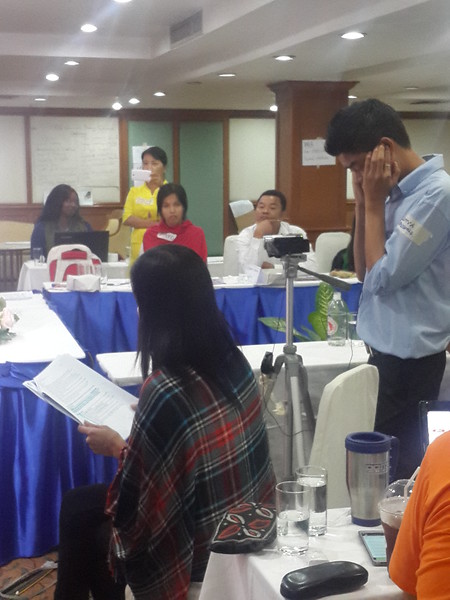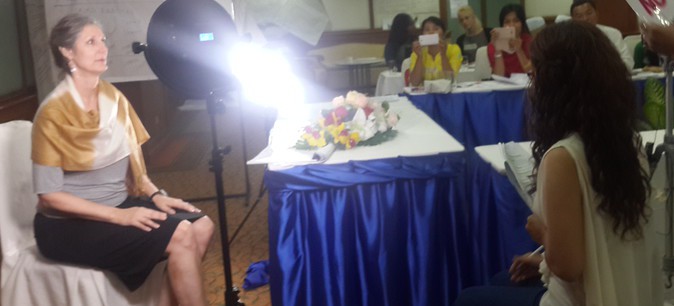As the music muted and the last images of an animated short film faded from the screen, the audience directed their gaze to the opposite side of the room. The sight that filled their eyes was that of a movie studio complete with cameras mounted on tripods, lighting equipment, microphones and makeup artists.
The audience consisted of the participants of the inaugural Asia Clinical Legal Education (CLE) Summer School held in Chiang Mai, Thailand from 5-12 June, 2015. Those setting up the lights and angling the cameras were BABSEACLE staff. They were preparing to teach mini-lessons to the participants about creative documenting and interview techniques needed to produce a high quality film or knowledge product.


The motivations leading to the design of this lesson emerged from our collective learning experiences at the summer school after Dr. Chris Walsh, a BABSEACLE Co-Director, provided mini-lessons on how to shoot an interview. This is further highlighted in this issue of the newsletter in a complementary article by Maxwell Abbot entitled, “Showing the Collaborative Work of Many: The Final Knowledge Product for the Myanmar CLE Programme.”
The Pro-Bono and Legal Ethics Consortium will be producing a documentary film or knowledge product that tells the story of establishing CLE programs in Myanmar. This collaborative project is funded by the United Nations Development Programme (UNDP) and the United States Agency for International Development (USAID). The documentary knowledge product is being filmed by BABSEACLE’s very own videographer, Hilang Myint Kyaw (Dang). The knowledge product is essentially a “how to” guide on establishing CLE programmes. It is anticipated the film will be relevant to a broad range of stakeholders including, but not limited to, government agencies, law faculties, law students, NGOs, and donor communities.
Various international team members involved in the programmes’s Final Knowledge Product structured a lesson plan on creative documenting—or shooting an interview—to outline steps and strategies to creating a high quality film and effective interviewing skills specifically designed for use when filming interviewees.
Hilang Myint Kyaw (Dang) provided instruction and advice from the perspective of a documentary director. Techniques from the Director included advice and instruction such as how to angle the camera to produce a dynamic scene, how to make those on camera appear confident, inviting, and appealing, what area to frame with the camera to create a balanced picture while reducing visual distraction, and how to eliminate background sounds which detract from the audio quality.

Hsar Moo and Laphai Nang Doi, two of BABSEACLE’s Legal Trainers in Myanmar, who will be conducting the interviews for the “Final Knowledge Product”, led a section of the lesson plan focused on effective question formation to facilitate capturing a dynamic interview on film. The techniques presented included asking open-ended questions that emphasize an emotional response from the interviewee and result in a connection with the audience. Such questions may begin with provocations such as “what are your hopes, desires, inspirations, concerns, and impressions?” Another effective technique specific to assist interviewees in providing a rich description of their experiences is to ask them to “tell me a story” which can then be followed up with “can you tell me more about that,” to provide a complete, cohesive, and congruent narrative for a documentary film.
Participants then had a chance to practice the skills taught by conducting a simulated interview. In small groups, individuals were assigned roles: director, interviewer, and interviewee. Some groups were so enthusiastic about the simulation that they actually recorded the interview on their phone or computer cameras.
The lesson concluded with a demonstration. Hilang Myint Kyaw (Dang), Hsar Moo, and Laphai Nang Doi conducted a recorded interview with two of the trainers present at the Asia CLE Summer School, Lisa Bliss, Associate Clinical Professor at Georgia State University College of Law and Freda Grealy, Head of the Diploma Centre at the Law Society of Ireland.
The outcomes for the session on creative interviewing and documenting were numerous and varied. From how to make your interviewee feel and appear confident to providing structured experience for the BABSEACLE team members working on the “Final Knowledge Product” and even resulting in capturing usable footage for this how-to documentary.
By Michelle Yockelson


